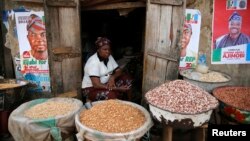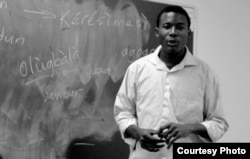The names given to a child by southwest Nigeria’s Yoruba people come with a certain meaning, which may be related to something like the time of year or to the circumstances of the child’s birth.
While linguist Kola Tubosun knows the meaning of his name, many of the other Yorubas he has met do not. So, he decided to do something about it.
Launched earlier this month, YorubaName.com is an online dictionary of traditional Yoruba names, aimed at Yoruba people who might have forgotten their name’s meaning or never learned it in the first place.
“The whole idea is to provide a central place where people can find all, hopefully all of the Yoruba names, be able to find its meaning,” said Dadepo Aderemi, the site’s head developer.
Yorubas are among the largest ethnic groups in Nigeria and have significant populations in neighboring Benin. Large numbers of Yorubas also live in Brazil and the Caribbean, as a result of the trans-Atlantic slave trade.
While the Yoruba language is widely heard across Nigeria’s populous southwest, Tubosun says educators undervalue it and other local languages.
Some parents would rather their children learn English as a way to to get an advantage over other students in the competition for jobs and opportunities, he says. In a country where two-thirds of the population live in poverty, both are in short supply.
“Over time, parents bought into this idea that if you don’t learn English, or don’t learn in English, or you don’t learn any other language other than English, then you are denying yourself a chance for a good future filled with opportunities,” Tubosun said.
That emphasis on learning English ends up harming local traditions, he says.
“I realized that something is going to get lost over time if we didn’t find a way to document these things,” said Tubosun, whose first name is given to males who are born into a newly-purchased house.
The dictionary is a work in progress, Tubosun said. He anticipates adding many more names to the site, along with a tool for people to hear the pronunciation of individual names.
Tubosun started the dictionary because he is Yoruba, but, he doesn’t plan to stop there; many cultures in Africa give names that have meanings, and he intends to expand the dictionary to other languages in Nigeria and across the continent.
With some 500 local languages in Nigeria, he has his work cut out for him.









